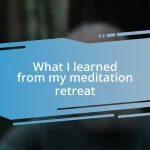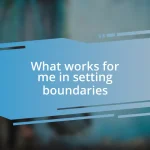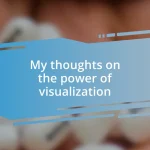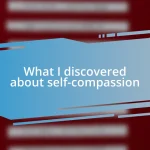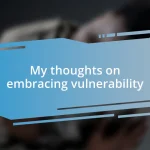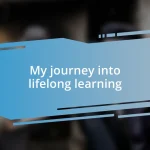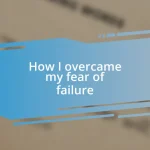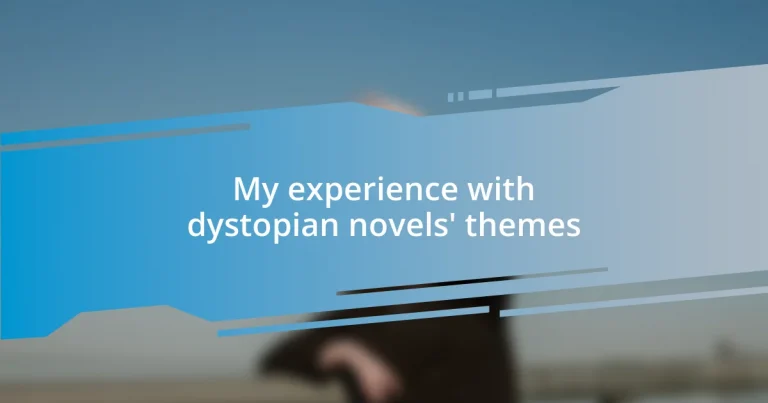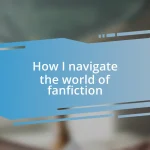Key takeaways:
- Dystopian novels explore themes of government control, loss of individuality, and societal collapse, prompting readers to reflect on their own freedoms and societal values.
- Characters often embody the struggles imposed by oppressive societies, leading to emotional conflicts and distorted relationships, which resonate with readers’ personal experiences.
- Essential dystopian reads like “The Dispossessed,” “The Handmaid’s Tale,” and “Station Eleven” challenge perceptions of society, freedom, and the enduring human spirit amidst chaos.
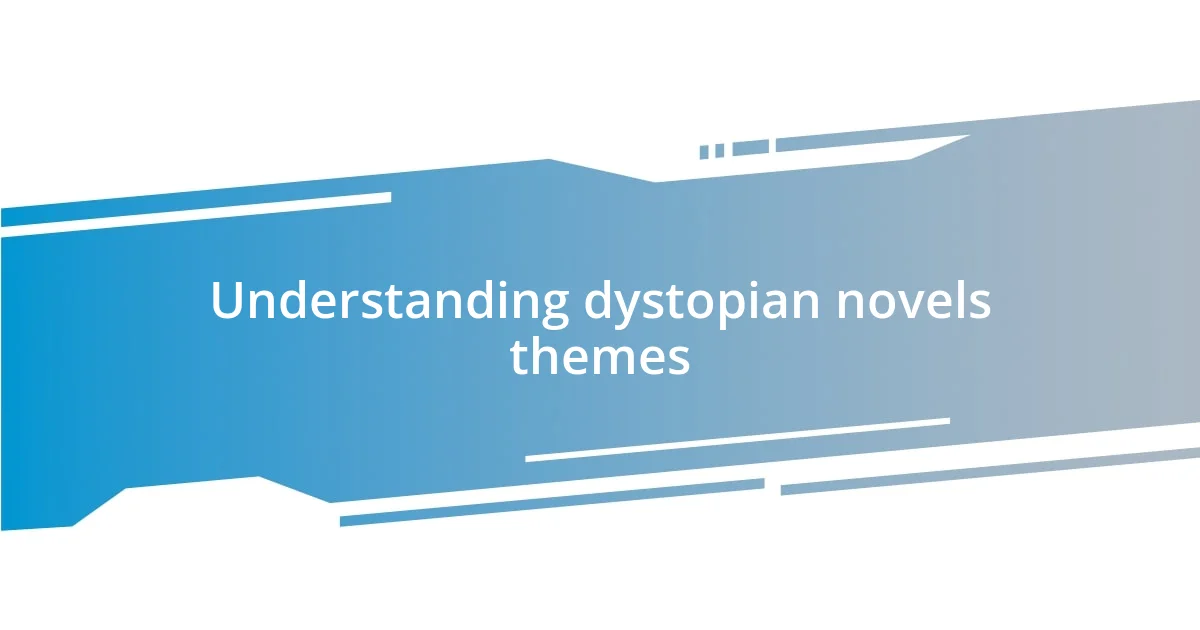
Understanding dystopian novels themes
Dystopian novels often explore the darker aspects of society, reflecting our fears and anxieties about the future. I remember finishing “1984” and feeling an unsettling chill; it made me question how close we might be to such a reality. Have you ever considered how these fears resonate in your own life?
Themes like government control, loss of individuality, and environmental degradation are common in dystopian literature. When I read “The Handmaid’s Tale,” I was struck by the way it highlighted the fragility of women’s rights. It raised a thought-provoking question: how far could we fall if we become complacent about our freedoms?
Characters in these novels often serve as mirrors to our own struggles, portraying a sense of hopelessness and rebellion. I found myself rooting for characters who dared to defy oppressive regimes, reminding me of the resilience we all have within us. Isn’t it fascinating how these fictional worlds can inspire real-life reflections on our values and beliefs?
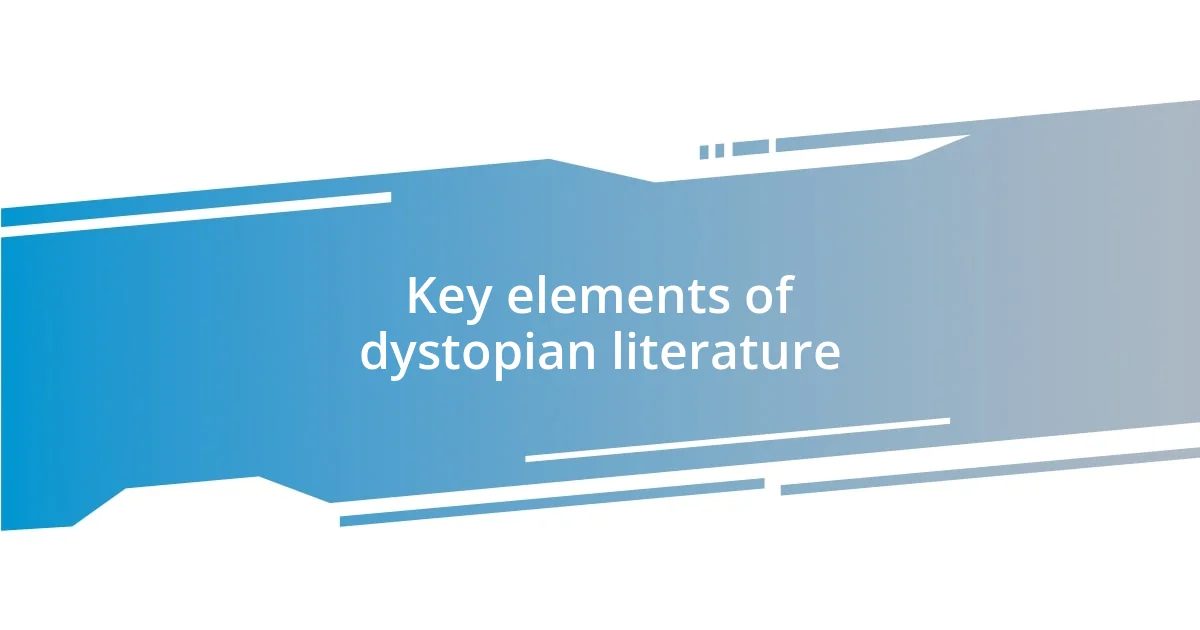
Key elements of dystopian literature
When I dive into a dystopian novel, I’m often struck by the theme of oppressive governments. These regimes typically use surveillance, propaganda, and strict laws to maintain control, which can feel eerily familiar in today’s world. It reminds me of a time during a very heated political climate when I felt like every word I spoke was being scrutinized.
Some key elements of dystopian literature include:
- Government Control: Often depicted through authoritarian regimes.
- Loss of Individuality: Characters struggle against dehumanization.
- Societal Collapse: A common backdrop showcasing the disintegration of social norms.
- Environmental Catastrophes: Highlighting the consequences of neglecting our planet.
- Technological Manipulation: Characters grapple with tech-integrated oppression.
Another prominent element is the way characters often feel isolated and powerless against their circumstances. I recall feeling intimately connected to protagonists who navigate loss and despair, feeling their struggles resonate deeply with my own moments of vulnerability. These characters often ignite a spark of hope, leaving us wondering if even in the darkest times, we can still forge our own destinies.
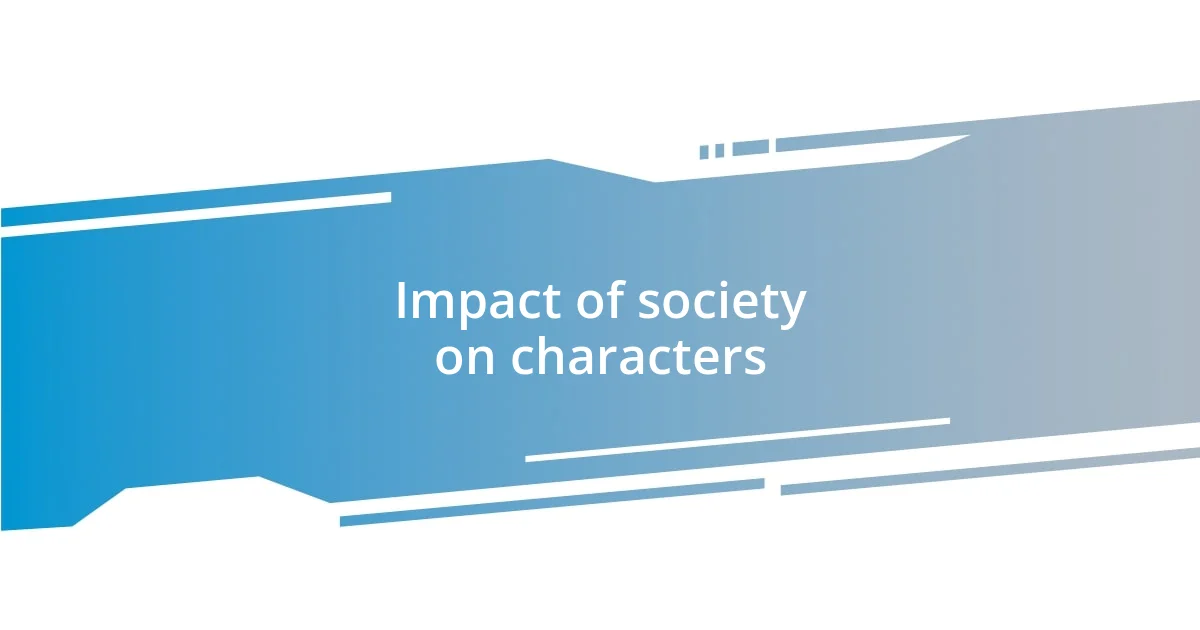
Impact of society on characters
Characters in dystopian novels often embody the struggles imposed by their societal structures. For instance, in “Fahrenheit 451,” the protagonist, Montag, grapples with a society that shuns independent thought and literature. I remember feeling a deep sense of empathy for Montag’s transformation; it was inspiring yet heartbreaking to see him awaken to the truths around him while faced with an apathetic world. How much do we sometimes ignore in our own lives?
The impact of society doesn’t just affect the physical actions of these characters; it also intrudes into their emotional landscapes. In “Brave New World,” I was struck by how the pursuit of superficial happiness caused characters to suppress their true emotions and desires. It felt painfully relevant to moments in my own life where societal expectations pushed me to conform, leaving me to question what genuine happiness means. Can we break free from societal molds, or do we subconsciously adhere to them?
Moreover, societal influences shape characters’ relationships and motivations in profound ways. I vividly recall the dynamics between characters in “The Handmaid’s Tale,” where the oppressive regime twists friendships into betrayals and love into fear. This theme left a lasting impression on me, making me reflect on how external pressures can distort our connections with others. What do you think happens to our humanity when society expects us to prioritize survival over companionship?
| Aspect | Impact on Characters |
|---|---|
| Government Control | Causes struggle for autonomy and leads to rebellion. |
| Social Isolation | Fosters deep-seated feelings of loneliness and despair. |
| Technological Manipulation | Shapes characters’ perceptions of reality and self-worth. |
| Emotional Suppression | Leads to inner conflict and identity crises. |
| Relationships | Distorts connections, turning love into a survival strategy. |
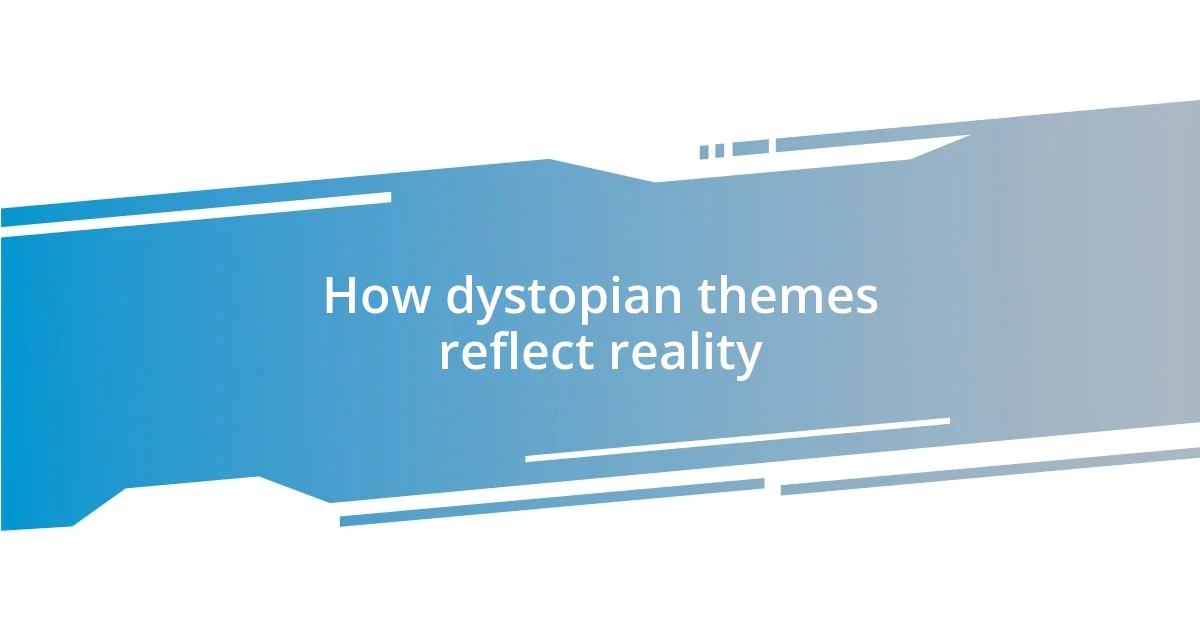
How dystopian themes reflect reality
Dystopian themes often shine a mirror on our reality, capturing the essence of fears about government overreach and loss of personal freedom. I remember reading “1984” and feeling a chill run down my spine, especially when the idea of “Big Brother” started to feel all too relatable. Don’t we often find ourselves glancing over our shoulders, wondering just how much privacy we truly have in a world saturated with surveillance?
Moreover, the emotional depth in these stories makes the themes all the more poignant. For instance, encountering the characters’ despair and isolation can evoke visceral feelings within me. I recall a moment in “The Road” where the bond between father and son brought me to tears; it reminded me of the fragility of connection in a world that can feel overwhelmingly bleak. Does it resonate with you too, this notion that love can be both a beacon of hope and a source of profound vulnerability?
Lastly, many dystopian narratives underscore environmental degradation, forcing readers to confront uncomfortable truths about our planet’s future. I often reflect on how “The Water Knife” pushed me to consider the consequences of apathy toward climate change. It made me wonder: are we heading towards our own dystopia if we continue ignoring the signs of collapse? These stories compel me to think critically about my responsibilities and the world around me.
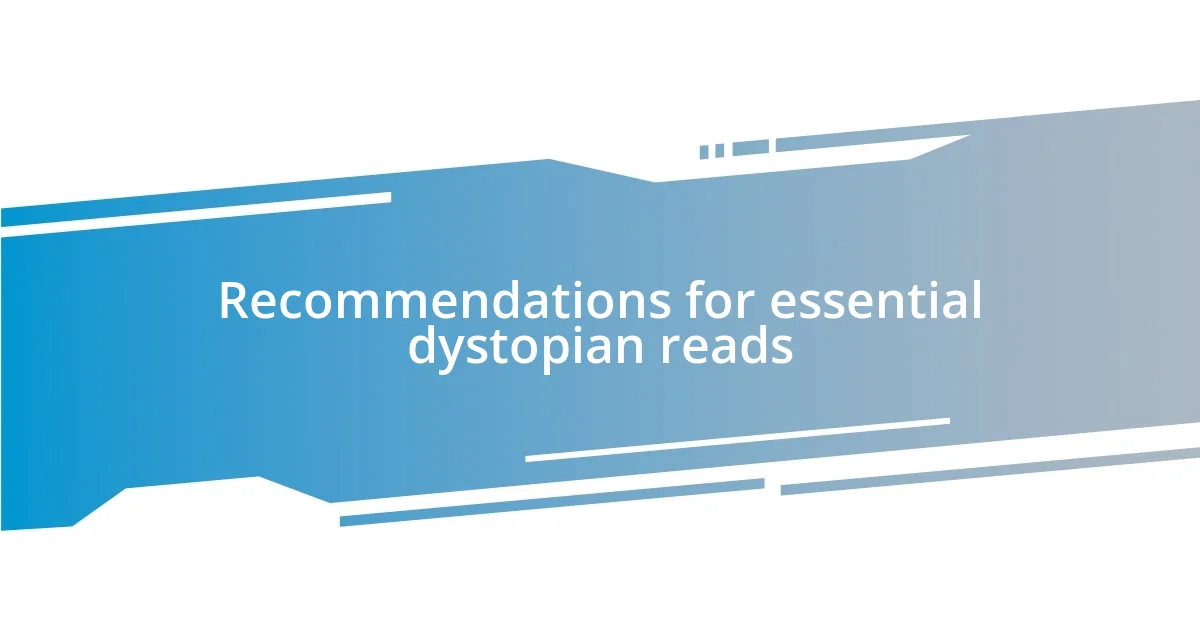
Recommendations for essential dystopian reads
One essential dystopian read that I can’t recommend enough is “The Dispossessed” by Ursula K. Le Guin. The way she delves into the clash between two contrasting societies—one capitalist and one anarchist—challenged my views on freedom and societal structures. I found myself pondering, what if the ideal society I envision is merely a utopian fantasy? Le Guin’s nuanced exploration of ideological conflicts truly opened my eyes to the complexities of social organization.
Another standout is “The Handmaid’s Tale” by Margaret Atwood. Every page dripped with tension and fear as I followed Offred’s journey in an oppressive regime that stripped women of their rights. It resonated with me on a personal level, igniting feelings of empowerment and resistance. Have you ever felt like standing up against something you know is wrong? Atwood’s work certainly encourages that introspective pondering.
Also, “Station Eleven” by Emily St. John Mandel left an indelible mark on me. The juxtaposition of a post-apocalyptic world with the enduring beauty of art and human connection spoke to something deep within my soul. It made me reflect on what truly matters in life. I often ask myself, if everything crumbles, what would I cling to? Mandel’s narrative is a poignant reminder that amidst chaos, the human spirit persists.
